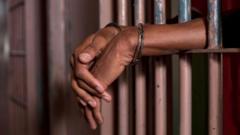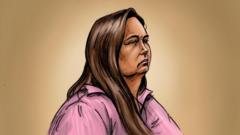The recent death sentences handed to five men for the murder of Dahare Abubakar, accused of witchcraft, have ignited discussions about the dangerous implications of such accusations in Nigeria, emphasizing the need for a societal shift in how these beliefs are perceived and acted upon.
Death Sentences in Nigeria Spark Debate on Witchcraft Accusations

Death Sentences in Nigeria Spark Debate on Witchcraft Accusations
Five men receive death sentences in Kano State, highlighting the ongoing violence linked to witchcraft beliefs in rural Nigeria.
In a high-profile case that underscores ongoing violence related to witchcraft beliefs, five individuals in Nigeria's Kano State received death sentences by hanging for their involvement in the murder of a 67-year-old woman, Dahare Abubakar. The tragic incident occurred in 2023 when Ms. Abubakar was attacked as she tended to her farm, suffering fatal beatings and stab wounds.
Following the attack, Abubakar's family reported the crime, leading to the swift arrest of the accused men in a village located 45 kilometers from Kano, Nigeria's largest northern city. As the case gained national attention, it has reignited discussions around the societal implications of witchcraft accusations in rural areas, where such claims often lead to severe violence and even murder.
Judge Usman Na'abba, presiding over the case, stated that the prosecution had established its case beyond a reasonable doubt. Prosecutor Abba Sorondiki expressed hopes that the verdict would serve as a deterrent against wrongful accusations and retaliatory violence inspired by baseless claims.
The court heard that the murder was instigated after the wife of one of the accused, Abdulaziz Yahaya, dreamt that Ms. Abubakar was pursuing her with a knife. This prompted Yahaya to rally a group to confront Abubakar, ultimately leading to her death.
Remarkably, this case distinguishes itself as the first instance in which multiple individuals have received death sentences for a murder linked to witchcraft accusations. The victim’s son, Musa Yahaya, described that fateful day as the worst of his life but expressed satisfaction with the judicial outcome.
Defending the accused, attorney Ma'aruf Yakasai announced plans to appeal the verdict, although such death sentences are infrequently enforced in Nigeria, where many convicted individuals remain on death row without execution. The case continues to fuel dialogues about the dangerous intersection of superstitious beliefs and violence in Nigeria, prompting a reassessment of cultural attitudes towards witchcraft.




















